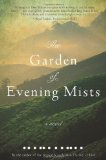Summary | Excerpt | Reviews | Beyond the Book | Readalikes | Genres & Themes | Author Bio

There is a goddess of Memory, Mnemosyne; but none of Forgetting.
Yet there should be, as they are twin sisters, twin powers, and walk
on either side of us, disputing for sovereignty over us and who we
are, all the way until death.
Richard Holmes, A Meander Through Memory and Forgetting
Chapter One
On a mountain above the clouds once lived a man who had been the gardener of the emperor of Japan. Not many people would have
known of him before the war, but I did. He had left his home on the
rim of the sunrise to come to the central highlands of Malaya. I was
seventeen years old when my sister first told me about him. A decade
would pass before I traveled up to the mountains to see him.
He did not apologize for what his countrymen had done to my
sister and me. Not on that rain-scratched morning when we first
met, nor at any other time. What words could have healed my
pain, returned my sister to me? None. And he understood that. Not
many people did.
Thirty-six years after that morning, I hear his voice again, hollow
and resonant. Memories I had locked away have begun to break
free, like shards of ice fracturing off an arctic shelf. In sleep, these
broken floes drift toward the morning light of remembrance.
The stillness of the mountains awakens me. The depth of the
silence: that is what I had forgotten about living in Yugiri. The murmurings
of the house hover in the air when I open my eyes. An old
house retains its hoard of memories, I remember Aritomo telling me
once.
Ah Cheong knocks on the door and calls softly to me. I get out
of bed and put on my dressing gown. I look around for my gloves
and find them on the bedside table. Pulling them over my hands, I
tell the housekeeper to come in. He enters and sets the pewter tray
with a pot of tea and a plate of cut papaya on a side table; he had
done the same for Aritomo every morning. He turns to me and says,
"I wish you a long and peaceful retirement, Judge Teoh."
"Yes, it seems I've beaten you to it." He is, I calculate, five or six
years older than me. He was not here when I arrived yesterday
evening. I study him, layering what I see over what I remember. He
is a short, neat man, shorter than I recall, his head completely bald
now. Our eyes meet. "You're thinking of the first time you saw me,
aren't you?"
"Not the first time, but the last day. The day you left." He nods
to himself. "Ah
Foon and I—we always hoped you'd come back
one day."
"Is she well?" I tilt sideways to look behind him, seeking his wife
at the door, waiting to be called in. They live in Tanah Rata, cycling
up the mountain road to Yugiri every morning.
"Ah Foon passed away, Judge Teoh. Four years ago."
"Yes. Yes, of course."
"She wanted to tell you how grateful she was that you paid her
hospital bills. So was I."
I open the teapot's lid, then close it, trying to remember which
hospital she had been admitted to. The name comes to me: Lady
Templer Hospital.
"Five weeks," he says.
"Five weeks?"
"In five weeks' time it will be thirty-four years since Mr. Aritomo
left us."
"For goodness' sake, Ah Cheong!" I have not returned to Yugiri
in almost as long. Does the housekeeper judge me by the increasing
number of years from the last time I was in this house, like a
father scoring another notch on the kitchen wall to mark his child's
growth?
Ah Cheong's gaze fixes on a spot somewhere over my shoulder.
"If there's nothing else . . ." He begins to turn away.
In a gentler tone, I say, "I'm expecting a visitor at ten o'clock
this morning. Professor Yoshikawa. Show him to the sitting room
verandah."
The housekeeper nods once and leaves, closing the door behind
him. Not for the first time I wonder how much he knows, what he
has seen and heard in his years of service with Aritomo.
The papaya is chilled, just the way I like it. Squeezing the wedge
of lime over it, I eat two slices before putting down the plate. Opening
the sliding doors, I step onto the verandah. The house sits on
low stilts and the verandah is two feet above the ground. The bamboo blinds creak when I scroll them up. The mountains are as I have
always remembered them, the first light of the morning melting
down their flanks. Damp withered leaves and broken-off twigs
cover the lawn. This part of the house is hidden from the main garden
by a wooden fence. A section has collapsed, and tall grass
spikes out from the gaps between the fallen planks. Even though I
have prepared myself for it, the neglected condition of the place
shocks me.
Excerpted from The Garden of Evening Mists by Tan Twan Eng. Copyright © 2012 by Tan Twan Eng. Excerpted by permission of Weinstein Books. All rights reserved. No part of this excerpt may be reproduced or reprinted without permission in writing from the publisher.
Your guide toexceptional books
BookBrowse seeks out and recommends the best in contemporary fiction and nonfiction—books that not only engage and entertain but also deepen our understanding of ourselves and the world around us.